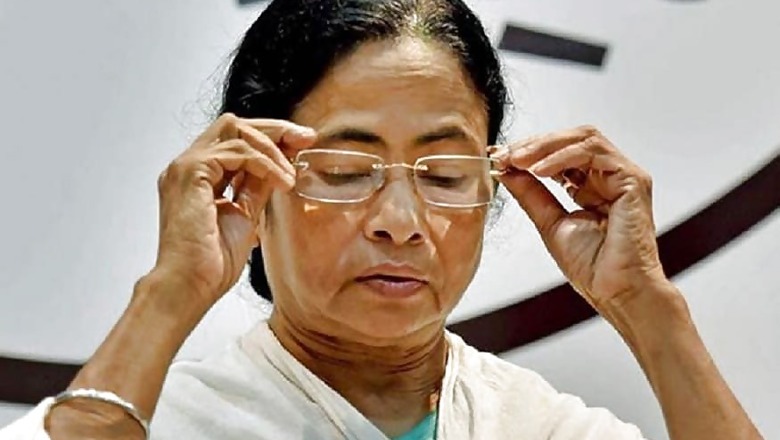
views
Naxalbari: Ten-year-old Shiba Mahali isn't concerned about the fact that his parents are among the most famous in Naxalbari and that the very mention of their names inevitably triggers a political debate in the area. He is just glad that his new house —where, in some ways, it all began — is a lot nicer than the one where he lived before.
His parents, Raju and Geeta, hosted BJP president Amit Shah in April at their village home at Dakshin Kotiajote. That Shah started the BJP campaign from Naxalbari wasn't a coincidence and neither was the fact that the couple left the BJP to join TMC days later. Gautam Deb, the state's tourism minister, then handed over a house to them built under Mamata Banerjee's housing scheme.
Over 50 years ago, an uprising in the North Bengal changed politics in the entire nation, and continues to do so, often violently. In Dakshin Kotiajote, like in the rest of Naxalbari today, there is yet another ideological battle that is playing out. Like earlier, the prime issues remain the same: crippling poverty made worse by social injustice. A key difference: it is not the Left that is promising a revolution, but the Right.
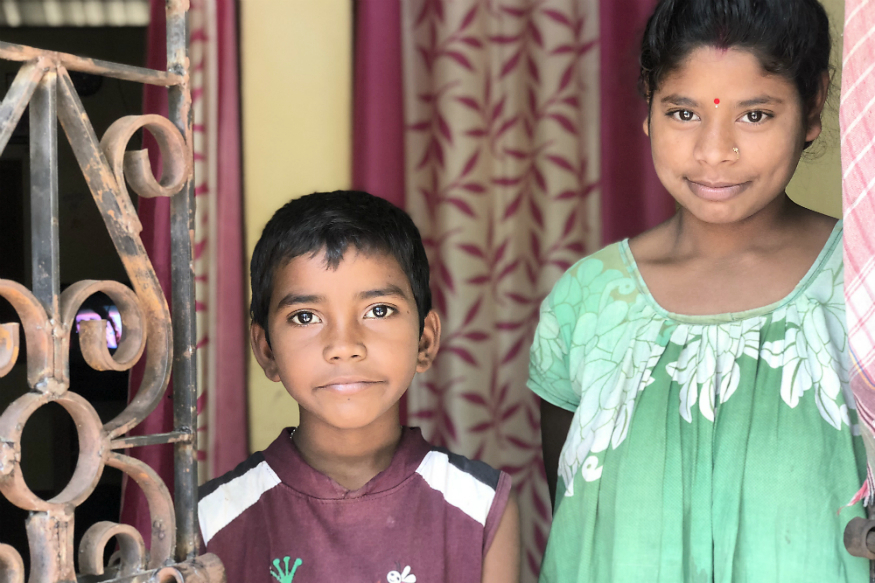
Shiba Mahali with his aunt Anjali.
While neither Raju nor Geeta wanted to talk politics, Shiba's aunt, Anjali said, "What can I say about politics. We just want to lead our simple lives." Since Shah's visit, the family has found itself embroiled in the state's intense electoral politics. Part of the reason stems from the strategic importance of Naxalbari, but leaders from both parties said that Naxalbari's importance can't be explained simply. "It's mythical, the place and what is represents," said one BJP leader.
The myth, like so many others, began with a bloodbath. The peasants, led by Charu Majumdar, Kanu Sanyal and Jangal Santhal, rebelled against the jotedars (landlords): land was seized and redistributed, land records were set ablaze, debts annulled and death sentences passed. An encounter with the police resulted in the death of police inspector Sonam Wangdi. In retaliation, the police opened fire on May 25 at villagers at Prasadjote village in Naxalbari, killing 10, including two children.
In July 1967, the Jen-min Jin-pao (People's Daily) of China had applauded the uprising, describing it as "a peal of spring thunder has crashed over the land of India." That thunder has long since dissipated.
Absent-minded Ramkumar Rai, a resident of Naxalbari, who runs a small electronics shop along the newly-widened National Highway 31, often slips into the vernacular of a former lifetime. “The hegemony that the TMC challenged — that it overthrew it — it imposes the same right now. It is everywhere.” The 32-year-old briskly explained that prices jumped after work began along the NH 31, initially by around 30 percent and were now at 60 percent of the original rates. “Many of us, who are descendants of bhagchashis (sharecroppers) sold off our land for below market rates. The land mafia didn’t give anyone an option,” he said.
Last August, the police arrested Trinamool Congress leader Joyprakash Singh Chauhan for allegedly grabbing a three-acre plot owned by the public works department — what police sources said was a part of a nexus of at least 70 persons, many of them party leaders. As per police sources, the land mafia had entered into questionable land deals, often forcing poor farmers to part with their land, in a bid to deal with the rising demand for land. This was a month after Mamata Banerjee, during an administrative review, had asked the police to take immediate action against the land mafia.
Land was just the beginning. Like the Left-Front, residents at Naxalbari said, the Trinamool Congress had become a “local mafia”. “They’ll help you during an emergency, sure. But they will fleece you, intimidate you. The only difference is that they don’t say ‘Lal Salaam’ to us while cheating us,” alleged Suresh Mahali, a 41-year-old farmer.
It is this brewing discontent that the BJP and the RSS have sought to capitalise on.
Until 2014, few knew that Madhab Bhawan in Siliguri’s Hakim Para was the nerve centre of the RSS’s North Bengal plans to increase its imprint from “Maldah to Gangtok”. The building — with a life-size statue of Bharat Mata on its front facade with the words “Himalayam Samarabhya Yavadindu Sarovaram Tam Deva Nirmitham Desham Hindusthanam Prachakshathe” (The sacred land which lies between the Himalayas and Indu Mahasagar is called the Hindusthan) — has expanded as the organisation grew in the area and housed its chief Mohan Bhagwat in December. Its strategy has largely revolved around opening ‘nationalist’ schools for tribal children and making inroads into the vulnerable tea gardens. The largest such school, in the area, is run by the Sarada Sishu Mandir, an RSS affiliate and sprawls over six bigha of land.
Abhijeet Mazumdar, son of Charu Mazumdar and the Darjeeling district secretary of the CPI-ML (Liberation), argued that “Bengal could be more vulnerable than any other state to the penetration of the RSS”. Before Mamata Banerjee, he said, elections were contested on ideological lines and not religious.
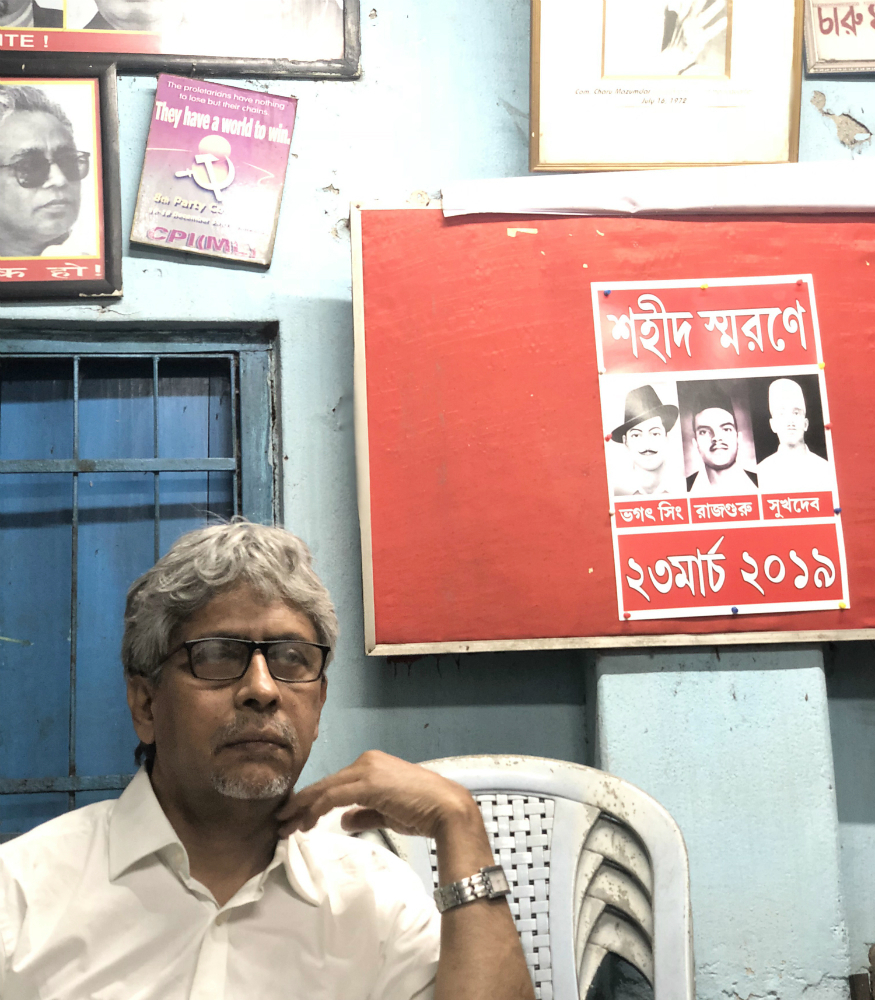
Abhijeet Mazumdar, Darjeeling district secretary of the CPI-ML (Liberation).
A key reason for the downfall of the Left, he said, was the dilution of that ideology. “A brand was created and it was propagated was towards as ‘Brand Buddha’. Perhaps the state leadership wasn’t corrupt, but staying in power for so long was a mistake. People lost their trust in the Left and a reason is their social surveillance, making inroads into families, getting involved in what happens in families and the last nail in the coffin was Singur,” he said.
It is this vacuum left behind by a decaying Left that the BJP hopes to capitalise on.
Not far from Naxalbari, a massive mall has come up on the outskirts of Siliguri. Many shops at the mall are closed and only the food court remains the prime attraction, along with a few other shops. “There was a tea garden here earlier,” said Sandeep Mahato (41), who now drives a battery-operated rickshaw back and forth from Naxalbari. “We have only heard of the BJP because of Narendra Modi and since many here are tribals, who don’t consider themselves Hindu, we don’t agree with what he has to say.”
But pointing to the scores who cross the road from the mall on the highway, where there were once tea gardens and fields, he said, “How bad can they be? And what other option do we have.”












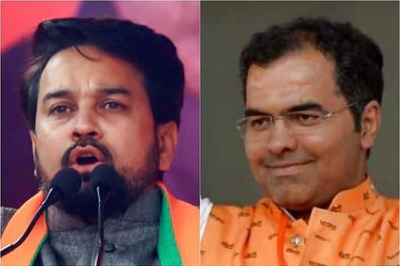


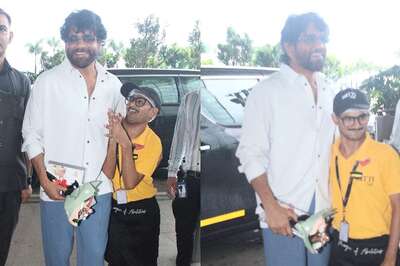



Comments
0 comment